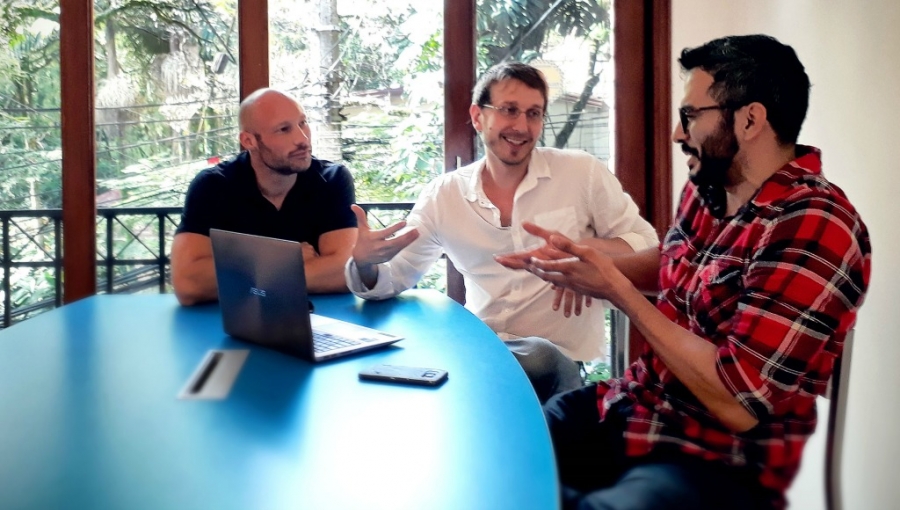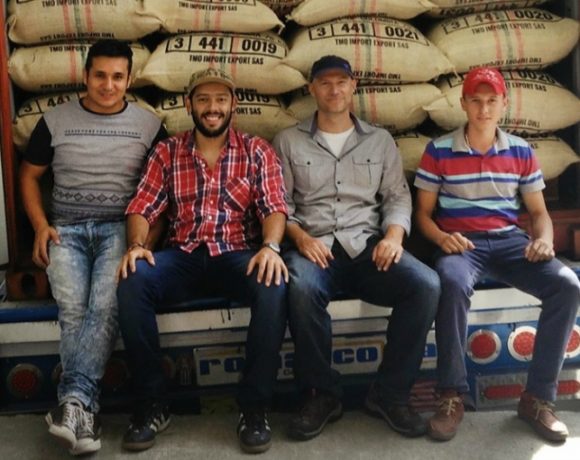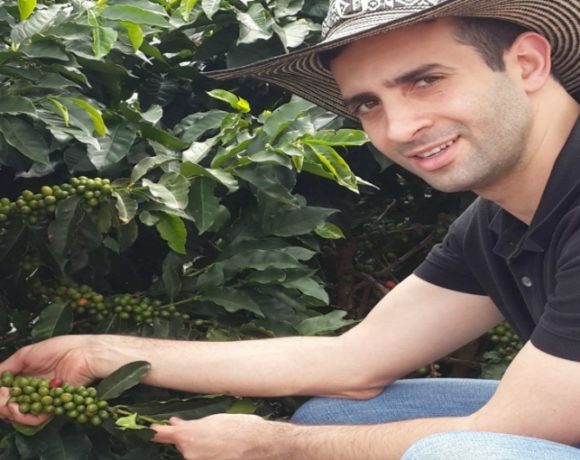‘Digital Nomads’ Becoming Permanent Medellin Residents: 3 Stories

Until recently, twenty-nine-year-old U.S. expat Steve Marcinuk – who has worked in 30 countries and scores of cities – could be tagged as a “digital nomad” who’s only temporarily in Medellin.
But that’s changing as Marcinuk – having just completed his first full year in Medellin — instead is putting down roots, making plans and becoming proficient in Spanish.
It’s a story that’s starting to repeat among a growing cadre of Medellin “former digital nomads,” thanks to greater experience, maturity, business growth, deepening social friendships, bilingual skill development and a romantic attraction that makes people fall in love with Medellin generally and (in certain cases) with a special person particularly.
Marcinuk is the founder of Net Positive Agency (see: http://www.netpositiveagency.com/), a Medellin-based startup that currently helps mainly U.S.- and Israel-based entrepreneurs and small businesses with sophisticated marketing strategies, social-media campaigns, “multi-level” marketing and business coaching.
This business is growing, as Marcinuk taps help from local and international collaborators at the budding network of “CoworkYa” co-working spaces — two locations so-far in the Poblado neighborhood, and four more planned.
At “CoworkYa,” Marcinuk enjoys a “full suite of services at much lower expenses” than what’s typically available for connected offices in major U.S. or European cities, he said. What’s more, Net Positive is now boosting capacity with its first full-time, local Colombian employee – with future plans that potentially could add five or six more.
Among Net Positive Agency’s recent clients:
1. A Jerusalem-based meditation center where Marcinuk helped launch a website and online marketing strategy, structure educational offerings and pricing strategies, and develop content-creation strategies;
2. An international summer film workshop, where Marcinuk worked with the CEO and recruitment director to overhaul the workshop’s online marketing strategy — including paid content promotion and “integrated sales funnels to attract clients” that would pony-up US$5,000 to attend.
3. A Boston-based educational startup that tapped Marcinuk to develop a business plan and marketing strategy in preparation for a US$100,000 Series-A funding round.
4. A Portland, Oregon-based nutritional consultant, launching a business focused upon a wellness-based, sustainable, organic diet. This work included developing client profiles, pricing strategies, website presence and packaged offerings to boost revenues.
Having launched his first entrepreneurial business at just 13 years old – as a balloon-art entertainer for “hundreds” of children’s birthday parties, bar mitzvahs and social events — Marcinuk well-knows the marketing challenges facing start-ups.
After graduating with honors in 2010 from the University of Pennsylvania’s prestigious Wharton School of Business – where he coordinated communications for the Wharton Interactive Media Initiative – Marcinuk subsequently launched another start-up, the “Dharma Balloon Experience,” bringing “balloon art to kids in need of smiles around the world.”
This year-long “passion project” brought Marcinuk’s balloon-art to orphans, refugees and children in countries including Israel, Egypt, Thailand, Indonesia, Vietnam, Palestine and Nepal, he said.
After completing that project, Marcinuk’s next venture was co-launching “Justifi” (see: www.justifi.org) a special-focus, non-profit, volunteer-tourism company where he served as chief operating officer for six years — and which now operates in seven countries around the world.
Justifi – still run by the founding partners – “pioneered and fine-tuned multiplatform, multi-stage inbound marketing” for a “niche market of Jewish students and young professionals” interested in tourism combining novel international experiences with social service, Marcinuk explained.
However, after six years of nearly constant travel for Justifi – changing cities every three or four days – “I wanted to find a place like Medellin, with a comfortable culture, which is affordable and close to the USA, and where I could leverage my marketing skills to other socially conscious businesses,” he said.
Hence the launch of Net Positive last year, which shares some similarities with Justifi: a preferential focus upon helping people and companies that aim to combine socially positive action with sound, sustainable business practices – and providing services to those companies at relatively bargain prices.
Medellin makes this possible, by offering a relatively low cost-of-doing business combined with availability of many creative, passionate and optimistic people, Marcinuk told Medellin Herald.
That combination of factors also allows Net Positive Agency to survive and grow at a relatively reasonable pace, he said.
“There’s less financial pressure here,” he said. “Being here has helped me to develop a business I want to run, versus just struggling to cover expenses. Because I don’t need so many clients, I can be more selective.
“Yes, I’d like to scale bigger, and eventually have my own office [rather than a co-working space]. But I’m not going to become a massive marketing company. My goal is sustainable, reasonable growth. It’s not about money or scale, but more about services to clients and doing good at each level of the chain.”
CoworkYa Founder’s Story
Rob Thorell — the 40-year-old founder of the growing CoworkYa chain here (see: www.coworkya.com) – was born in Canada but raised in the U.S., as his parents were lucky winners of a “green card lottery” that enabled legal migration to the U.S.
That landed Thorell in Fort Lauderdale, Florida, where he eventually attended Florida State University in a special five-year career program that included computer-science studies.But Thorell later dropped out of that program after three years and instead went to work for the Grant Thornton consultancy, analyzing proposed initial public offerings (IPO) in the emerging U.S. high-tech sector, he said.
Subsequent jobs involved working for a company that was pioneering voice-over-internet- protocol (VOIP) technology, then later as a security subcontractor to the U.S. Department of Homeland Security, then a stint at TheGlobe.Com, at the time a sort-of-predecessor to Facebook.
But then came the dot-com crash in 2008 — where nearly all TheGlobe.Com employees lost their jobs — and a simultaneous crash hit Thorell’s Florida real estate investments, resulting in an upside-down mortgage.
This financial reversal eventually prompted Thorell and a partner to scramble for alternatives, which eventually led to the launch of a novel, online car-title-lending service.
This business was financially successful, but Thorell later had a falling-out over share-of-profits. What’s more, certain business partners were alleged to have been embezzling funds.
Legal actions to straighten-out this financial mess are likely to drag-on for years, Thorell told Medellin Herald.
In the meantime, Thorell had decided in 2015 that it was time to move-on to new horizons elsewhere – this time, to Medellin.
Having already been familiar with Medellin – where he had first visited in 2010, and where his ex-wife still lives – Thorell eventually came to realize that he could run an online business full-time here, rather than in Florida, where he had suffered so much business trouble.
So, Thorell rented an office next-door to his current location in the Poblado neighborhood and started a call center, initially for outbound calls. However, his company got hit by a U.S. Telephone Consumer Protection Act (TCPA) “robo-dialing” lawsuit “even though we were not robo-dialing.”
That prompted him to convert the call-center business to inbound-only, customer-service calls, he explained. However, building a successful call-center business means operating every day of the week – not shutting-down for Colombia’s numerous national holidays.
Unfortunately, the first coworking space Thorell had rented for his new call-center business shut-down on those holidays, which forced him to shift the service – uncomfortably — to his apartment on holidays.
That experience prompted Thorell to seek out a new coworking space that wouldn’t be closed on holidays and where he could personally verify the credentials of everyone working or renting there. At that new space, Thorell now has five full-time employees working the call center (which operates like an outsourced secretarial service for companies), in addition to renting space to entrepreneurs at the “CoworkYa” site.
While coworking spaces that lack walls are familiar and acceptable to many “digital nomads” in Medellin, Thorell discovered that’s not the case with native Colombians, who prefer more private spaces, he said.
So, Thorell remodeled his first “CoworkYa” offices – which first opened in December 2016 – to accommodate Colombian clients seeking greater privacy.
What’s more, Thorell is just now completing the remodeling of a second “CoworkYa Suites” office complex across the street, which features modular, movable walls. A U.S. investor-partner is funding this expansion, which is expected to be followed by four more “CoworkYa” sites over the next two years.
Explaining the market niche for “CoworkYa,” Thorell told us: “I saw how difficult it is to get reasonably priced office space here. The Colombian-entrepreneur market needs more opportunity than is currently available in the local market. There is a huge gap between the demand and supply for real estate here. There are big new office complexes here, but even the smallest spaces are offered at COP$5 million [US$1,680] per month, for spaces not much bigger than the spaces we offer here.”
‘New Yorker in Medellin’
Yet another “digital nomad” at “CoworkYa” – who collaborates with Marcinuk’s “Net Positive” company here – is 37-year-old, El Salvador-born, New York City-raised Juan Carlos Amaya, a bilingual expat now developing long-term business-and-living plans here.
Having been a stock-broker in New York (until the market crash in the early 2000’s) and subsequently a front-row witness to the Barcelona real-estate-market crash in 2008, Amaya has acquired — the hard way — a knack for anticipating market bubbles, he said. But Medellin, he says, is still a long way away from a similar bubble.
Amaya came to Medellin six months ago, initially doing sales-and-marketing freelance work. But he later landed a separate gig as a real-estate sales broker at First American Realty here, which targets expat investors buying and renting local properties.
Besides the real-estate broking and the sales-and-marketing collaborations with Net Positive, Amaya also is the founder and editor of the “New Yorker in Medellin” blog (see: www.anewyorkerinmedellin.com).
While this blog helps generate potential sales leads for his real-estate broking, it’s more of a passion and a hobby, he added.
“I just love telling foreigners about this city,” he said. Having once lived in Barcelona, “I can see a lot of parallels between Barcelona [in the decade prior to the 2008 real-estate crash, when apartment prices previously were fairly cheap] and Medellin. It’s great to be here, and more people are getting used to the idea of expat retirement here.
“Here you can live in a real cosmopolitan city — and I’m a native New Yorker, so I’m used to a cosmopolitan life. You can’t do that in a small town, like in a beach town in Costa Rica. Here, you can have big-city entertainment, and a cheaper and better quality of life. And over the next 10 years, real estate is really going to move up here,” he predicted
















